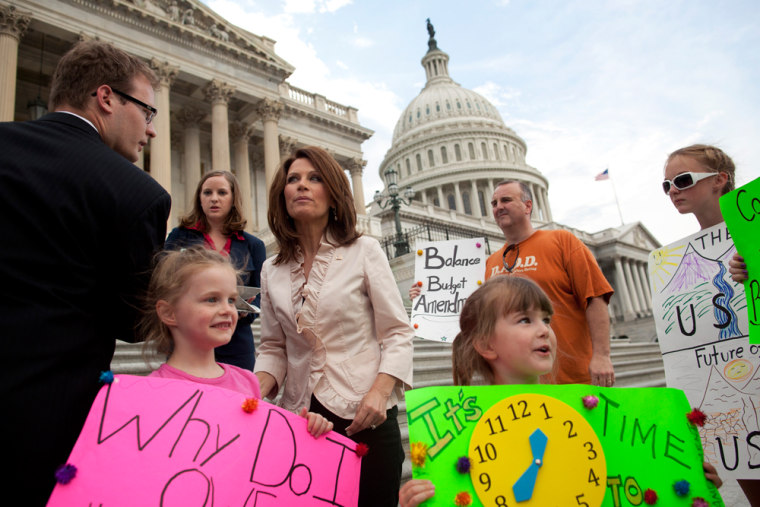The success of Tea Party-backed lawmakers in defining the terms of the debt debate in Washington has further cemented the party’s identity as part of a conservative movement insistent on deep spending cuts, lower taxes and smaller government.
But as Republican candidates gear up for 2012, many are struggling with whether to embrace those passions. Opposing the debt ceiling increase and linking arms with the Tea Party may help candidates tap into a reservoir of energy in their party’s electorate. But it also threatens to alienate the candidates from independent voters who grimaced at the bickering in Washington this summer and preferred greater compromise on issues like tax increases.
“The process didn’t please anyone,” said Whit Ayres, a Republican pollster, “but it was very clear that the new congressmen elected in 2010 dramatically shifted the debate from how much more shall we spend to how much shall we cut.”
Soul-searching
In the coming 2012 elections, the strategic calculation for Republican candidates weighing Tea Party ties “depends on the state, depends on the politician and it depends on the particular race,” Mr. Ayres said.
Evidence of political uncertainty is everywhere, and this week’s debt votes in Congress highlighted the Republican soul-searching, doing little to clarify a simple path to Republican victory.
The Tea Party caucus in the House split in half on the final debt ceiling vote. In the Senate on Tuesday, 19 of the chamber’s 46 Republicans voted against the bill, while the rest sided with the party leadership in supporting it. Some of those facing Tea Party challenges, like Senator Orrin G. Hatch of Utah, voted no, while others, like Senator Richard G. Lugar of Indiana, voted yes.
The Tea Party had accused both Mr. Hatch and Mr. Lugar of failing to take the movement’s conservative principles seriously. But on Tuesday, Mr. Lugar called the compromise bill to raise the nation’s debt ceiling and cut federal spending a “victory for conservative fiscal responsibility.” He is betting — or maybe, hoping — that the Tea Party will agree.
Meanwhile, Mr. Hatch voted against the legislation, perhaps mindful of how easy it would be for conservatives who seek to oust him to turn a “yes” vote into an effective bumper-sticker slogan suggesting he is in favor of more government spending.
“Orrin has made the decision to highlight every ultraconservative vote he’s ever made, and he’s going around saying ‘I was Tea Party before it was cool to be Tea Party,’” said Bob Bennett, a former Republican senator from Utah who was defeated by a Tea Party candidate in the Republican primary in 2010.
“I have no way of knowing at this point how that’s going to play out,” Mr. Bennett, now at the Bipartisan Policy Center, said in an interview Tuesday. “We all agree we want smaller government and less intrusive government. But when you move to specifics, the unanimity breaks down.”
For the Republican lawmakers, their votes represented a complex interplay of ideology and political reality — like when and against whom they face an election-year challenge. The debate has also put the party’s presidential candidates on the spot as they struggle to attract Tea Party support in nominating contests months away, while remaining mindful of a more centrist general electorate.
For the presidential candidates, their stand on the debt ceiling could become a new proxy for their allegiance — or lack of it — to the Tea Party. And it could serve as a test of how far a Republican candidate can push back against the movement’s all-or-nothing approach to governing, especially during primary season.
Over the weekend, Mitt Romney, who is seeking the party’s presidential nomination, condemned the deal after weeks of noticeable silence on the issue, while Jon M. Huntsman Jr., a Romney rival, called it “a positive step.”
“Jon Huntsman was the only one who said given the choice before us, ‘choose to pay our bills,’ ” said Mr. Ayres, who serves as the chief pollster for Mr. Huntsman’s campaign. “When you are balancing the future fiscal reputation of the country, one would hope that real leaders would stand up and call for the country to avoid default.”
The other leading presidential hopefuls are betting that Mr. Huntsman’s argument will not hold up to scrutiny among Republican primary voters in places like Iowa, New Hampshire and South Carolina. And the candidates are eager to maintain a sharp contrast with President Obama by opposing a high-profile bargain he made.
“Mr. President, the real losers in the budget deal were the American people who will continue to be subjected to your failed economic policies,” Representative Michele Bachmann of Minnesota said in a statement Tuesday.

Republican candidates who supported the debt limit compromise face threats of retribution from groups like the Club for Growth. But other conservatives are more forgiving, urging Tea Party members not to turn the 2011 debt-limit vote into a litmus test issue like the 2008 bank bailout vote known as TARP was.
Richard Viguerie, a veteran of decades in the antitax trenches, issued a statement on Tuesday calling the debt vote something on which “honest conservatives” could disagree and urging unity.
“This is not the time to start fighting amongst ourselves,” Mr. Viguerie said. “Nothing could make the left happier than to see a splintering of the Tea Party movement.”
This story, "," originally appeared in The New York Times.